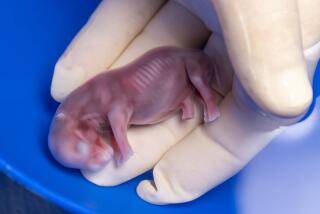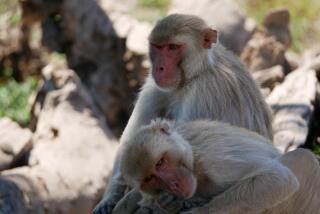A Biochemical Bar to Cloning of Humans?
- Share via
Scientists say they have discovered a biochemical obstacle that would make the cloning of human embryos very difficult, if not impossible, using current cloning technology.
The study, conducted by scientists at the University of Pittsburgh and published today in the journal Science, was carried out with rhesus monkeys in an attempt to determine why these animals have proved hard to clone. The scientists found that during the process, proteins crucial for normal cell division were lost from the cell -- causing the cloned embryos to divide a few times, stall and then die.
Senior author Gerald Schatten and co-workers said this finding has lessons for human cloning. Rhesus monkeys are more closely related to humans than any other animal so far cloned and have a biology similar to ours.
In addition, in the few attempts at cloning human embryos for medical research purposes, the process has broken down very early in development in a manner closely mirroring that of the monkeys. This implies there is a similar block in human and monkey cloning.
Cloning involves removing genetic material from an egg and replacing it with DNA from a nonreproductive cell such as a skin cell. The egg is stimulated to divide, then implanted into a surrogate mother to develop. Since 1996, a variety of mammals have been cloned, including sheep, pigs, mice and cows.
Although the birth of two cloned rhesus monkeys was reported in 1997, no one has been able to clone another.
Schatten and colleagues introduced DNA from skin and other cells into 724 monkey eggs whose own genetic material had been removed. Of those, 33 began dividing and were transferred to female rhesus monkeys to develop. No pregnancies resulted.
The scientists then examined the developing embryos with a microscope -- and found that as the embryo divided, the tight bundles of DNA known as chromosomes were not being passed on to new cells in an orderly fashion. As a result, cells ended up with extra copies of some genes and lacked other genes altogether. The correct balance of genes is crucial for normal development.
“From the outside, they look like terrific embryos,” Schatten said. “But when we looked inside, at higher magnification, we realized that the chromosomes have been scattered, in a helter-skelter fashion.”
The group also found the source of the mistake. At the very first step in cloning, when the egg’s genetic material is removed, two proteins known as HSET and NuMA are also sucked out of the egg cell. The job of these two proteins is to pull the chromosomes to the right places during cell division so that each new cell inherits a complete set of genes. Without the proteins, this dragging of chromosomes cannot be done.
In mammals that have been cloned, enough of these proteins remain floating in the egg’s fluid for reproduction to occur.
Roger Pedersen, a Cambridge University researcher who conducted human cloning experiments while at UC San Francisco, agreed that the work by Schatten’s group highlights an obstacle for those who are interested in exploring the use of cloned, embryonic stem cells to make genetically matched tissues for treating diseases.
“I’m not convinced,” disagreed Dr. Robert Lanza, medical director at Advanced Cell Technology Inc., a Worcester, Mass., company researching cloning. Lanza said it is premature to conclude that the cloning block in monkeys will be intractable: Two monkeys already have been cloned, he noted. Nor does he believe that what goes for rhesus monkeys will also go for human cloning. Every species that is cloned has its own set of nuances that just have to be worked out, he added.
Schatten said his group is working on a cloning method that appears to preserve the two crucial proteins. If this method successfully bypasses the block, scientists would be able to obtain cloned monkey embryonic stem cells and, eventually, cloned monkeys.
By extrapolation, human cloning for both medical therapies and the creation of cloned babies might also one day be possible.
However, Schatten stressed that he is opposed to reproductive cloning because evidence from animals shows that it is not medically safe, and that the work from his group pinpoints one more potential source of error.
“Human reproductive cloning is unsafe, unethical and it ought to be illegal,” he said.






